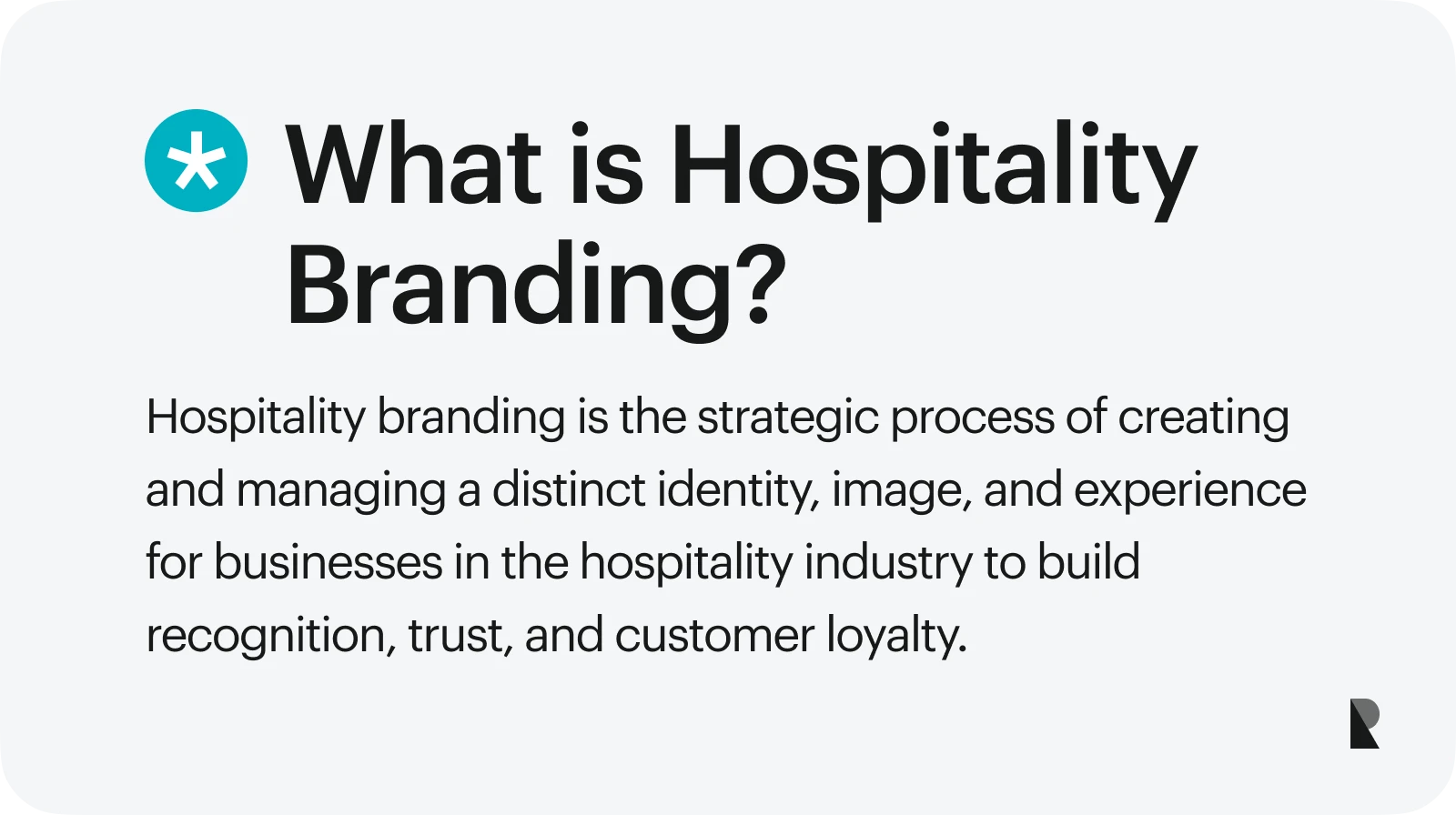
We see a barrage of content from hotels, lodges, and Airbnb's describing the cozy and relaxing vibes they bring. While this content gets high engagement, many do not translate to bookings. An Instagrammable atmosphere alone is not enough to elevate your brand.
Successful hospitality branding requires building status, exclusivity, and a loyal niche. You must learn to craft and implement a hotel branding strategy that can dominate the market.
What is Hospitality Branding?
Hospitality branding is beyond having a nice-to-look-at website or a strong social media presence. It is about crafting an entire identity for your hotel or accommodation that encapsulates your brand values, vision, and mission. This identity includes your visual design, brand values, personality, and how you communicate with guests through marketing.
Ultimately, hotel branding can help you attract guests who align with your brand. It makes your business instantly recognizable, trustworthy, and desirable compared to your competitors. It's the foundation that allows your brand to grow.
Importance of Branding in the Hospitality Industry
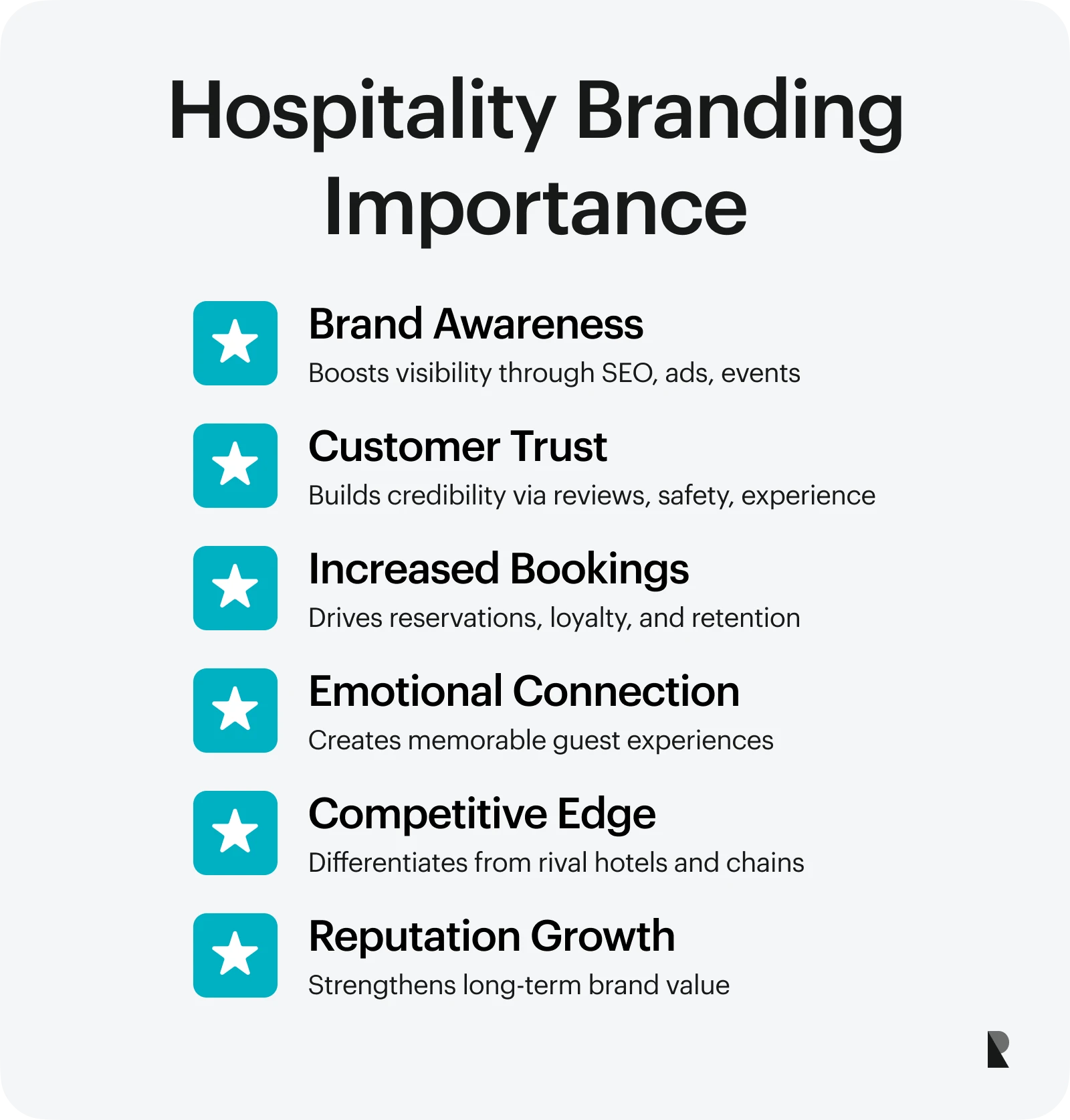
Hospitality branding allows companies to achieve their goals by increasing brand visibility, shaping brand perception, fostering trust, and enticing customers to book their stay with you and keep coming back.
Building brand awareness
Most travelers plan their hotel stays in advance, typically taking a couple of weeks to three months. During this period, they rely on what they find online, especially if they're new to the destination.
So, if your accommodation is not visible online and offline, it is unlikely to be booked. With strategic hospitality branding, you can put your business at the top of the list through search engine optimization, social media marketing, influencer marketing, paid ads, and hosting events. These increase the chances of guests being aware of and engaging with your brand.
According to Statista, Hilton, Holiday Inn, Marriott, and Hampton are the hotel brands leading the brand awareness race in the United States in 2024.
Establishing customer trust
Finding the right hotel or accommodation requires more than comfortable and beautiful rooms. Guests should be able to trust you and feel a connection to stay safe with you. Employing hospitality branding strategies can help you establish and nurture customer trust.
For instance, travelers read reviews from other guests before booking. This makes creating a guest experience that wows and connects with your guests a priority. You should also highlight your company's efforts to ensure safety and cleanliness. Collaborating with highly trusted businesses can help.
Increasing bookings
Finally, effective hospitality branding can attract booking guests. More people are likely to choose you when there is significant awareness about what you can provide to your guests, good reviews from past customers, and an excellent hotel experience.
You can also encourage repeat bookings by integrating loyalty rewards and other membership programs into your hotel branding. Keep giving your guests reasons to come back!
Essential Elements of a Successful Hospitality Brand
The success of your hospitality brand depends on how well you establish key elements, such as your brand identity, messaging, guest experience, marketing strategy, and brand name.
Brand identity
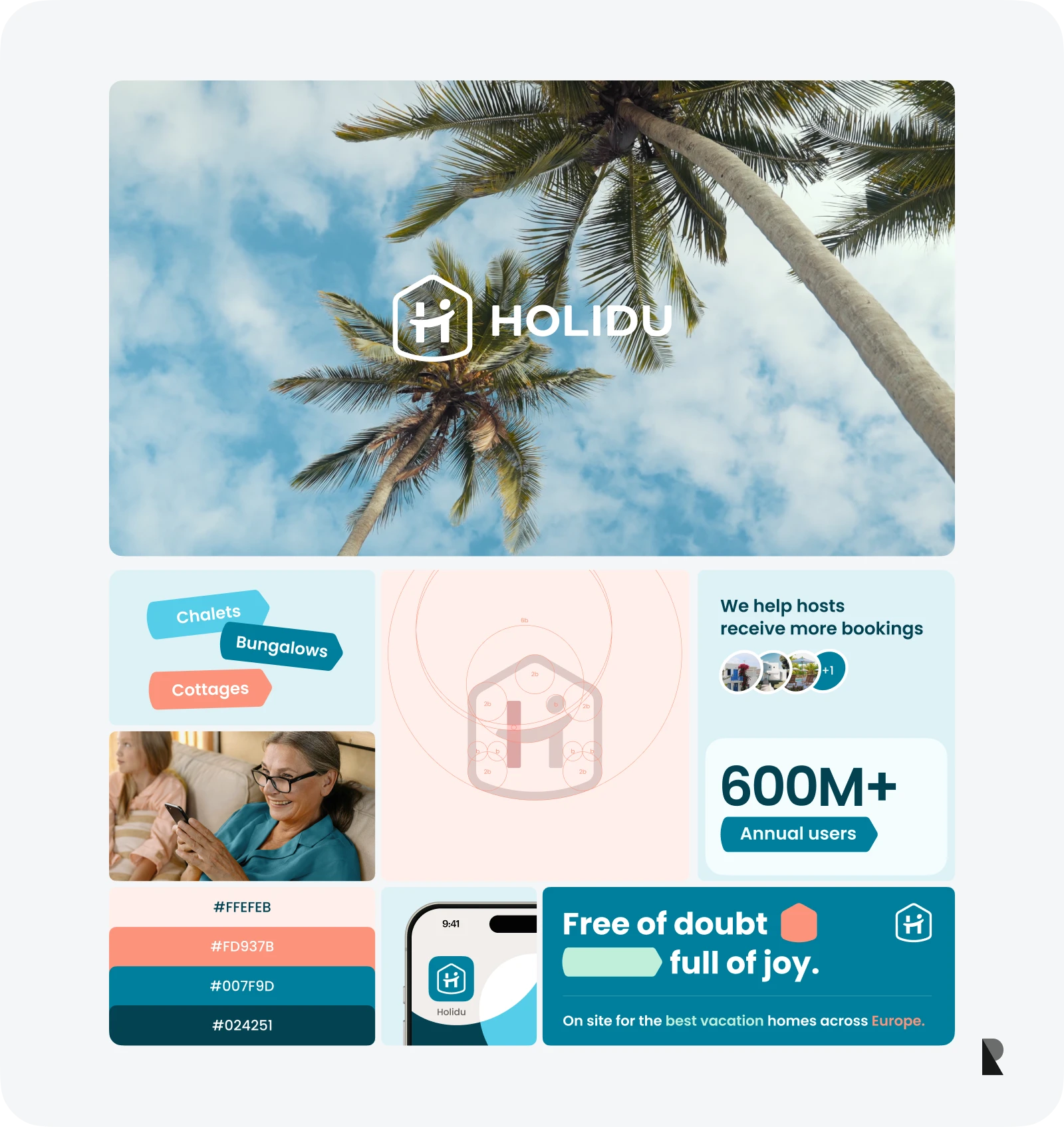
A brand’s identity culminates in its values, mission, messaging, and personality. It informs how it should present itself to the public and forms its brand reputation. When a hospitality company has a strong brand identity, it is easier for people to differentiate it from other brands and resonate with it. A strong brand identity can also leave a powerful impression on potential guests.
A good example is Aman Resorts, which has successfully set itself apart from its competitors and gained recognition and trust through its minimalist yet confident brand style. Aman Resorts’ luxurious and peaceful energy makes guests feel special.
Brand messaging
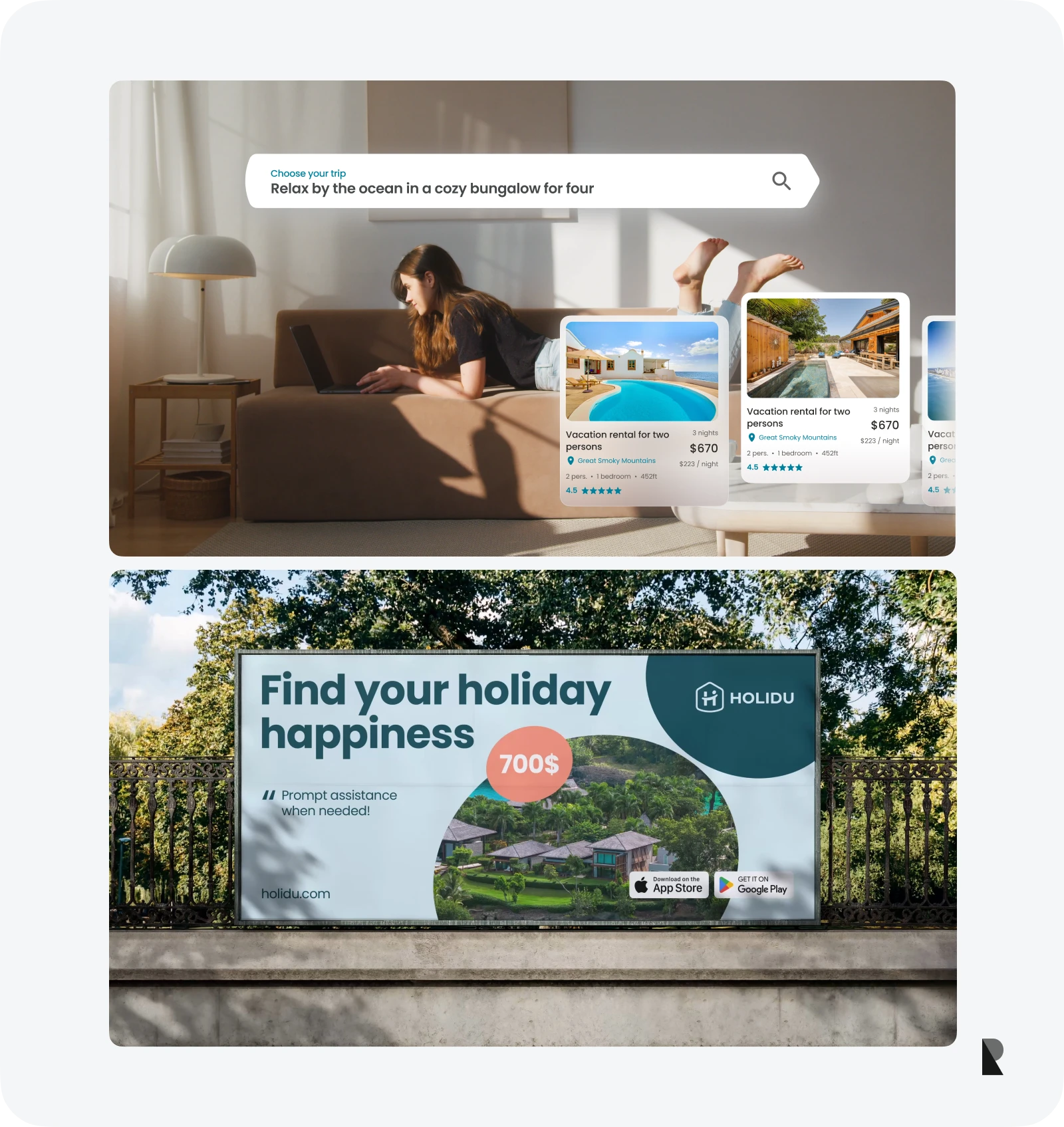
A brand message encapsulates your company's sense of purpose. It tells the story of what your hotel is about and why people should choose you over others. When a brand message is conveyed effectively, it can bridge trust by making people confident about their choices.
A good brand message can also connect meaningfully and evoke the emotions you want people to associate with the hotel. This can be done through storytelling and tailoring the brand message to different types of guests while maintaining consistency across all brand touchpoints.
Designing consistent marketing materials
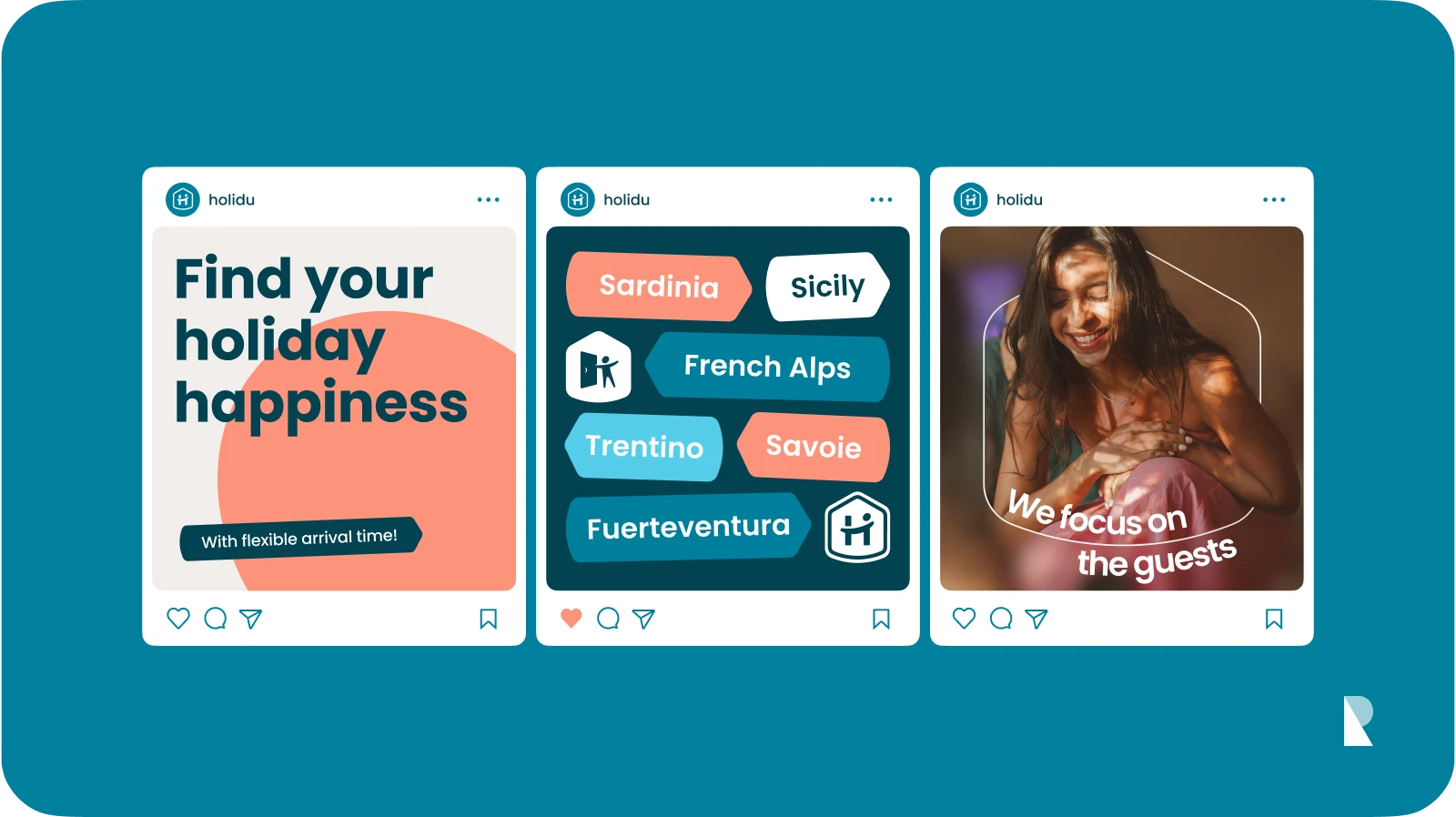
Create design templates for common assets like newsletters, flyers, and social posts. This makes it easier for your team to produce new content while maintaining a consistent brand look.
Develop a brand style guide covering your logo design, colors, fonts, and other hotel branding elements. The style guide should provide rules, examples, and tips to ensure proper usage of brand assets. Continuously monitor brand marketing channels and address any discrepancies in real-time.
Holistic, values-aligned guest experience
A hospitality company needs to curate experiences that best reflect the brand ethos. If your brand values sustainability, start by providing eco-friendly bathroom amenities.
Implement rules that promote eco-conscious habits, like discouraging the use of plastic bottles and straws. You can also offer nature-based tourism activities, like kayaking through mangrove forests and organic cooking classes.
Creating an appropriate brand name
Your chosen brand name should be unique and match the brand image you want to present. The name should feel warm and inviting if you're a family-friendly hotel. A modern and professional name might be more appealing if you're targeting business travelers.
Your brand name could also include words that suggest what guests can expect, like 'Inn,' 'Resorts,' or 'Suites.' Finally, try to humanize it by weaving in a personal or historical connection.
So, why not work with a branding agency and create a strategic hospitality brand to bring you closer to your goals? With years of experience building brands from the ground up, Ramotion is one of the brand design firms you can trust. Get in touch with the team for a winning hotel brand strategy!
5 Steps to Establishing a Strong Hospitality Brand
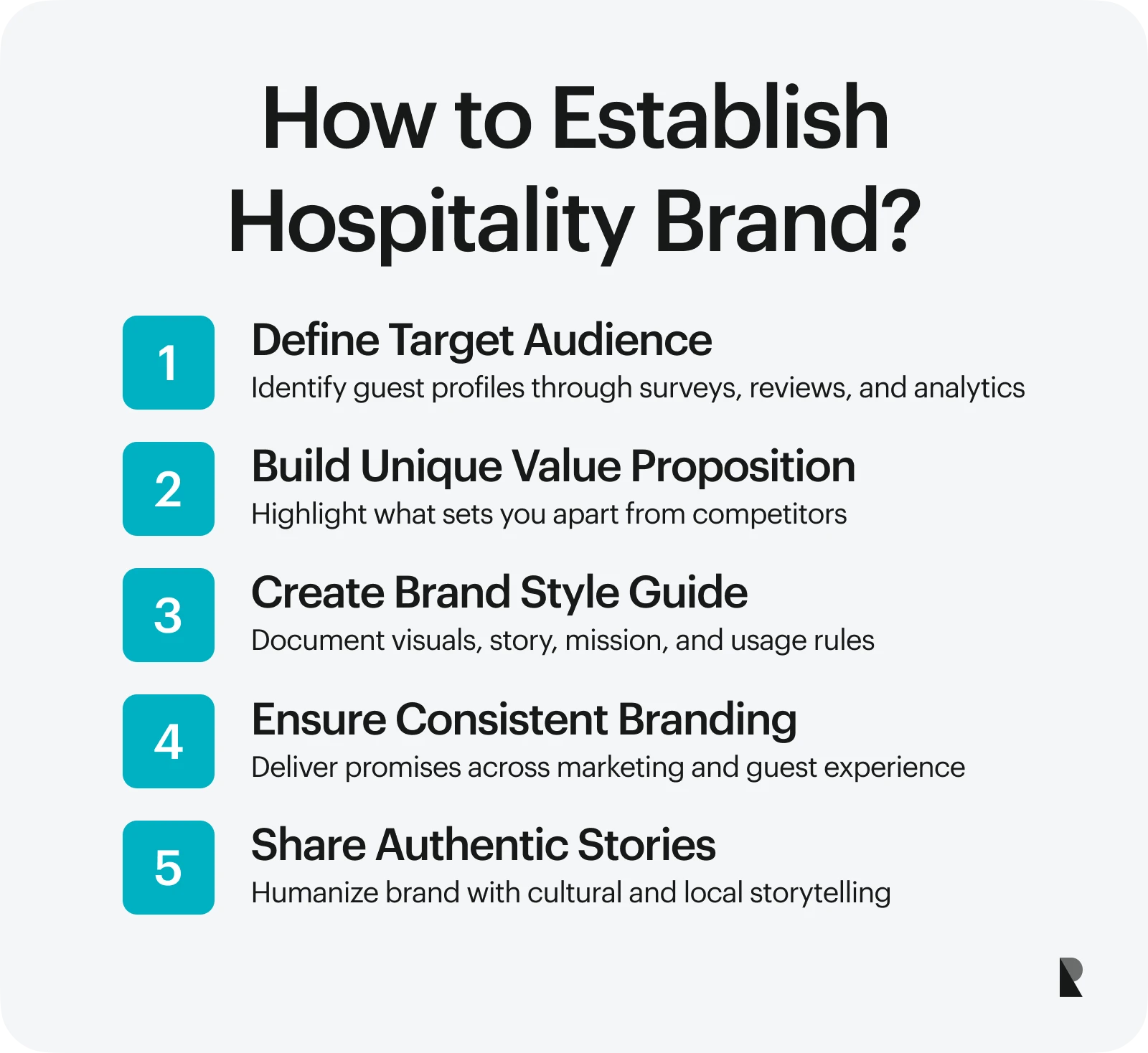
You can build on the following steps to create and implement a successful hospitality brand strategy.
Step 1: Identify your target audience. Who are your guests?
Knowing your core audience helps create hotel branding and marketing efforts that resonate with your potential guests, preventing you from wasting resources. Knowing your audience also allows you to strengthen your brand by developing a unique selling proposition that they need.
You can learn more about your hotel's target market by running online surveys, analyzing reviews on different booking platforms and even Google, utilizing Google Analytics to track online performance and customer behavior, and monitoring your competitors.
Step 2: Develop a unique value proposition. What makes you different?
Once you understand who your hotel is for, it's time to develop a unique value proposition. Your unique value proposition pertains to the feature or aspect of your brand that makes it distinct from your competitors. It's the core reason why guests choose you over hotels.
Some examples of a hotel's unique value proposition are:
- Immersive cultural experiences
- Family-friendly and pet-friendly features
- Luxurious amenities and personalized services
- Sustainable practices and goals
Offering something new can be challenging, especially in a saturated market. Hence, it is vital to find gaps in your competitors' services that you can fill.
Step 3: Create a brand style guide
Next is to create the style guide of your brand to ensure consistency.
A brand guideline or style guide is a comprehensive document that explains the design thinking behind your visual branding elements—logo, colors, fonts, images, etc. It also includes the brand story, values, mission, message, and goals. The brand style guide aims to help users understand and master the brand like the back of their hand. It teaches them how to use brand assets correctly through examples and other informational tidbits.
Step 4: Consistently implement hotel branding
Building a presence online and offline can be overwhelming. With different demands for each, it's easy to lose focus. However, consistency is crucial for creating awareness and a positive brand perception.
You can achieve this by ensuring you can deliver on brand promises in your marketing materials. Your branding should be visually appealing but also felt through the in-person experience. Failing to live up to this often results in bad reviews.
It pays to be selective about where you establish a brand presence. Focus on highly relevant platforms for your target audience. A dedicated team should also regularly monitor your brand's performance.
Step 5: Let them know you behind the scenes
Resonating with your audience requires staying authentic to your brand core. It entails humanizing your brand so that people can easily relate to you.
Weave cultural storytelling into your hospitality branding strategy. In a scenic area, highlight the unique local environment and cultural aspects. Share stories of how your brand enriches the surrounding community. Let them take part in local activities or festivities.
These simple yet impactful actions bring guests closer and create a more dynamic experience. Allowing them to participate makes them feel like they are part of the story.
Examples of Successful Hospitality Brands
Let's examine some of the world's most popular hospitality brands and learn what makes them successful.
The Ritz-Carlton

The Ritz Carlton has become the gold standard in the hospitality industry with its impeccable branding. Image via Ritz Carlton

Signature hotel room interiors via Ritz Carlton
The Ritz-Carlton's credo states, "We pledge to provide the finest personal service and facilities for our guests who will always enjoy a warm, relaxed, yet refined ambiance. The Ritz-Carlton experience enlivens the senses, instills well-being, and fulfills our guests' unexpressed wishes and needs."
Hospitality Branding Strategies:
- Personalized anticipatory customer service
- End-to-end employee training
- $2,000 per client rule
- Strategic high-value partnerships
The Ritz-Carlton is a globally recognized brand in the luxury hotels segment. Guests are greeted with elegant decor, fine dining, and high-end amenities. But what makes the brand stand out is its personalized and anticipatory service.
Employees undergo rigorous training to embody the brand values and deliver exceptional experiences. The brand also implements a rule allowing employees to spend up to $2,000 per guest to resolve issues immediately without managerial approval.
This customer-centric approach has led the brand to launch The Ritz-Carlton Leadership Center, which caters to organizations that may benefit from its leadership development practices. The Ritz-Carlton maintains its prestigious image by collaborating with other brands of the same level.
Some of its high-profile partners include reputable brands like Tiffany & Co., Perrier, luxury fashion brand Late Checkout, and Mercedes-Benz.
Marriott
Another popular hotel brand is Marriott. What makes it successful is how diverse its portfolio of hotels is, catering to different audiences in mid-tier to luxury markets. In addition to The Ritz-Carlton, you'll find St. Regis, EDITION, and The Luxury Collection for its upmarket customers. They also have Courtyard by Marriott, Four Points by Sheraton, and JW Marriott for business travelers.
Hospitality Branding Strategies:
- Franchise-driven growth approach
- High focus on the business travel sector
- Meetings Imagined campaign
Marriott International operates everywhere! The brand has almost 9,000 hotels in 131 countries, making it the largest hotel chain in the world. The brand's success can be attributed to its franchise-driven growth model, which allows it to expand globally.
Instead of the parent company owning and managing everything, independent hotel owners are allowed to operate under Marriott International's brands for a fee. And because of the brand's high reputation in the industry, franchises can penetrate the market successfully.
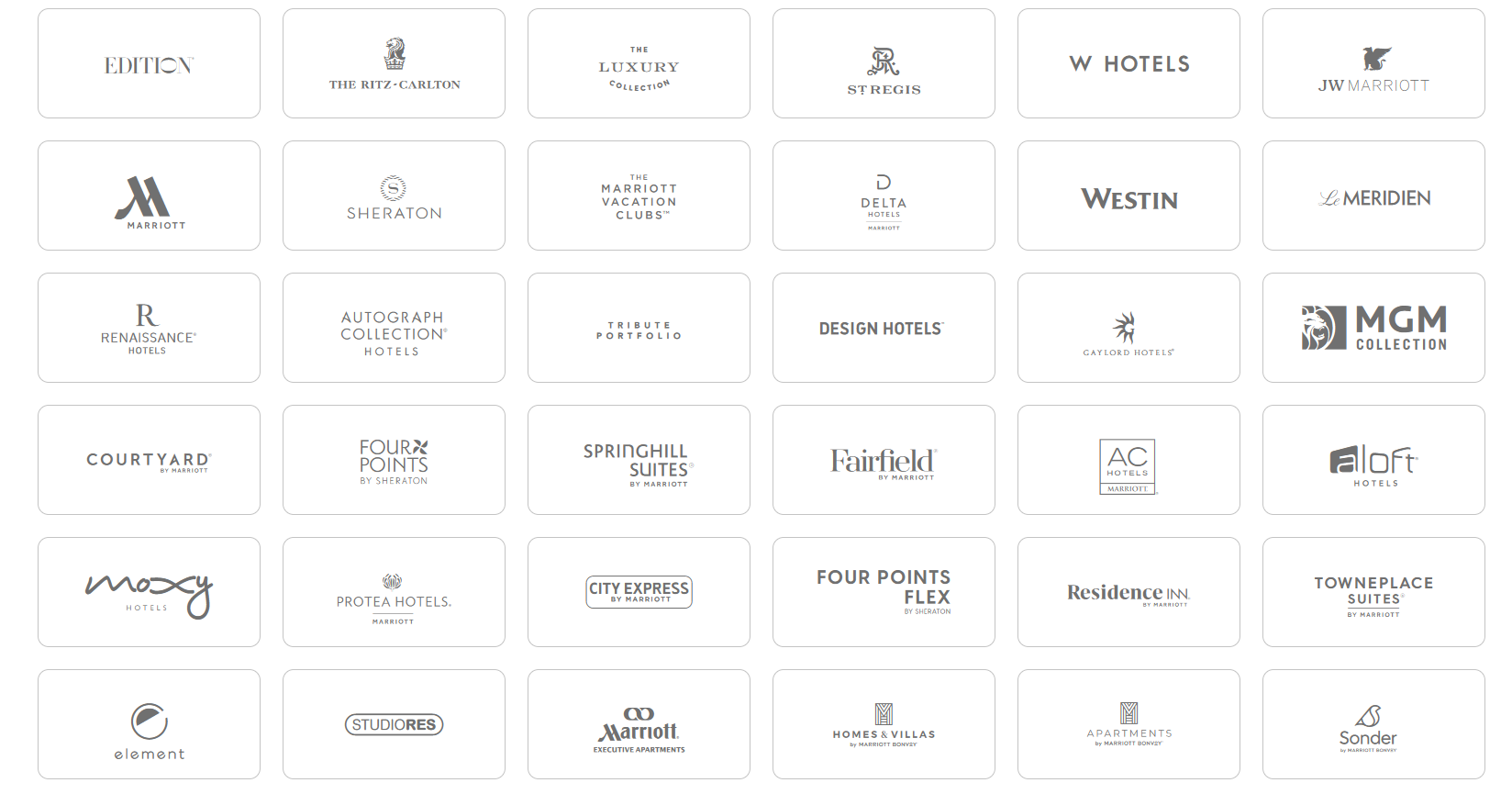
Hotel brands under Marriott International. Image via Marriott
Another facet of its successful hospitality branding is its Meetings Imagined campaign, launched in 2014. To attract business travelers, Marriott worked with industry experts and psychologists to identify six meeting personas and create meeting solutions for each.
With research-backed information, the brand incorporated meeting spaces and services, like flexible room layouts to accommodate people, and carved out special nooks for other creative purposes. The hospitality brand also partnered with leading tech brands, like Microsoft and Cisco, for advanced tech integration.
Travelodge
Now, let's look into an equally successful hospitality brand in the budget hotel sector: Travelodge.
Hospitality Branding Strategies:
- Basic yet efficient hotel amenities
- Accessible locations
- Technology-driven services
Travelodge is a leading budget hotel chain in the UK and several other countries, including Spain, Ireland, New Zealand, and Australia. The brand's popularity is due to its low-cost guest experience, which provides only the essentials.
With an average daily rate of $95.5 (or £70.5), Travelodge provides rooms with basic amenities and no premium add-ons. There are no restaurants or room service, either. On the plus side, the brand has flexible rates for travelers who prefer to book hourly. This pricing model attracts budget-conscious travelers looking for competitive room rates.
While hotel services are sparse compared to more expensive ones, Travelodge hotels leverage convenience by being in prime locations. They are near transportation, airports, or city centers, making them an excellent choice for those prioritizing accessibility over comfort.
Travelodge also seamlessly integrates technology into the guest experience. Guests can book their stay, check-in, and check out from their rooms online. Rooms also have keyless entry, which helps minimize staffing expenses and paves the way for cost-efficient operations.
Rising Trends in Hospitality Branding
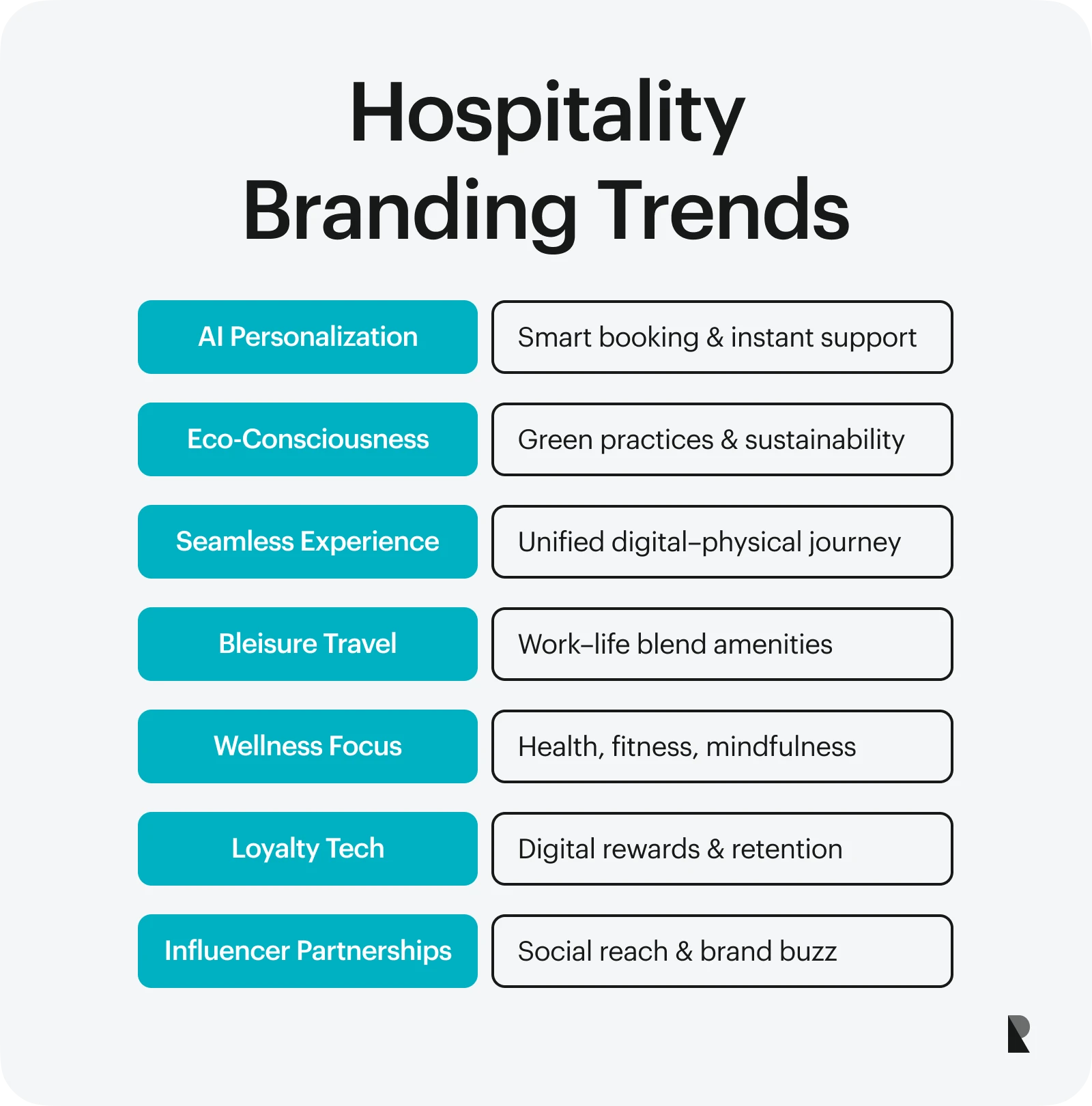
AI-powered personalization
With the rise of mobile websites and apps, hotels can now assess guests' wants by reviewing their past data with AI analytics tools. This helps the hotel suggest similar room options for their next booking.
Some hotels also use AI-powered in-room amenities, where guests can calibrate room settings through voice commands. If guests need anything, they can send their requests to AI chatbots, which are available 24/7 for timely communication.
Eco-conscious hotel branding
Many hotels are installing solar panels to power their facilities, reducing their carbon footprint. Some hotels, especially nature resorts, have eliminated single-use plastics to reduce pollution.
And some even go the extra mile by educating and encouraging guests to participate in their sustainability efforts.
Seamless physical and digital experience
People's physical and digital lives are deeply enmeshed. Guests can now book everything online instead of calling the hotel directly. Some hotels also allow mobile check-in, so guests do not need to queue at the reception.
Kiosks are becoming more common, allowing hotel guests to book spa treatments or find local attractions. This will enable guests to manage their entire stay without talking to someone, which is great for introverts!
Bleisure: work and leisure
The digital world has carved a new "leisure" (business and leisure) trend: people can now work remotely from holiday destinations. This has created a demand for accommodations catering to business and leisure needs.
In response, hotels offer specialized amenities like meetings and workspaces with high-speed internet. They also provide corporate traveler packages with special rates. This leisure trend truly allows people to attain a work-life balance.
Hotel Branding for the Future
The hospitality industry is changing rapidly. Companies must adapt to new technologies, prioritize sustainability, and deliver personalized and inclusive experiences. The most successful hospitality brands will be those that can anticipate and meet these demands while building meaningful relationships.
Stay ahead by future-proofing your hospitality brand. Upskill your team to elevate the level of service you provide. Be more involved with your local community and partner with small businesses to create an authentic and enriching experience for your guests. Cybersecurity and data privacy are also crucial to safeguarding your customers.
May 29, 2025
